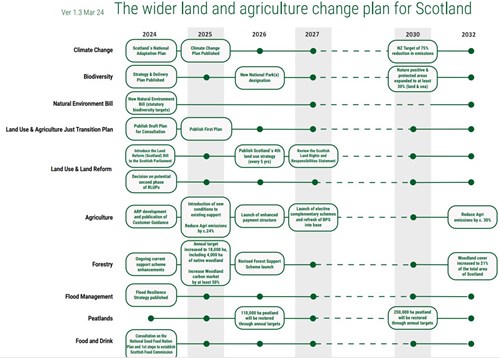Further details of the actions farmers will have to take in order to receive agricultural support payments from 2025 have been announced by the Scottish Government.
While there are no structural changes to the scheme in 2025, new criteria for support are being introduced, so that farmers will need to understand their additional obligations and consider how these will be met.

(Image: Scottish Government)
The details are contained in an update to the Agricultural Reform Route Map, addressing food production, nature restoration and climate change mitigation.
In the future at least half of all funding for farming will focus on outcomes in biodiversity gain and climate change mitigation and adaption. Businesses that are able to reconcile the dual requirements of producing food sustainably and restoring nature will be best placed to maximise available agricultural support beyond 2025.
Other changes in the new framework include:
- Introduction of the first Whole Farm Plan conditions, which require that farmers complete two “baselining” activities from options including carbon audits, biodiversity audits, soil analysis, the creation of animal health and welfare plans or integrated pest management plans. If farmers do not already have these plans and audits in place through either quality assurance or supply chain contracts, they will need to be completed prior to next year’s Single Application Form return in order to meet minimum standards.
- New conditions for peatlands and wetlands under Good Agricultural Environmental Condition (GAEC) 6 of Cross Compliance – a mandatory set of requirements – to help protect carbon stores. The new standards aim to prohibit a range of activities from being carried out on peatland and wetland areas including ploughing and cultivation; drainage and activities that expose the soil.
- A new calving interval of 410 days measured on an individual animal basis has been added to the Scottish Suckler Beef Support Scheme, to help cut emissions intensity and make beef production more efficient. All animals claimed from the 2025 scheme year onward will be subject to the new calving interval conditions, regardless of their year of birth.
This is the latest update from Government on the path to a major new framework for agricultural support in 2027.
Land management in Scotland is changing and as the direction of travel begins to incorporate natural capital responsibilities in addition to the traditional roles of farmers and growers, Galbraith’s breadth of knowledge and experience in representing the best interests of farmers and landowners makes us very well placed to offer insightful and informed advice on how to navigate the new framework and ensure businesses are both compliant and well placed to thrive in a changing environment.
- Natural Capital: Galbraith’s expert advisers guide our clients in realising value in all land uses – by assessing and measuring natural assets, furthering opportunities in biodiversity net gain, and ensuring stakeholders are rewarded fully for their investment in and contribution to delivering ecosystem services and net-zero outcomes.

